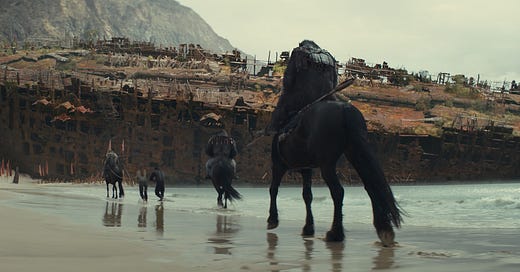Kingdom of the Planet of the Apes
Solid worldbuilding provides a foundation for an overfamiliar story.
Kingdom of the Planet of the Apes is a thought experiment about building a better world from the rubble of an old one that tore itself apart. The details and the worldbuilding open up the story for contemplation, even though the general shape of the story isn’t particularly new. Kingdom opens by recounting briefly what happened in the three films that came before: a humanmade virus infected the apes on Earth, granting them intelligence and the ability to speak; the same virus wiped out most humans and robbed the survivors of their own intelligence and speech. These movies treat their premise as a thought experiment: If humans suddenly had to share the planet with another intelligent species, would we recognize them for the people they are, and would we share our resources? From the apes’ perspective: How do we build a society out of the ashes of another civilization that exploited us? How do we figure out how to live for ourselves?
Kingdom of the Planet of the Apes continues the thought experiment by jumping forward “many generations” in time. Caesar—the protagonist of the three previous films, played with extraordinary emotional nuance by Andy Serkis—is long gone, forgotten by many. The apes who do remember him either treat his memory as a religious icon of community and mercy or else as a rallying cry for strength and conquest. (The difference between belief systems is intriguing, but the movie drops it shortly after raising the issue.) Humans have become herds of animals drifting across the face of the earth in search of food and shelter. Apes, in turn, have forgotten much of their own history, choosing instead for the most part to live in tiny villages built into the metal ribs of old transmission towers and rusted-out boats, tucked amongst the cliffs of crumbling skyscrapers now covered in vegetation. The world has moved past the uneasy coexistence between Caesar’s apes and the human survivors of the virus, but the scars of that old conflict still remain, even if they’re no longer fully understood by the creatures that now inhabit the world.
Kingdom lingers over the question of memory, soaking in the green cliffs that were once former cities and that now serve as a rite of passage for young apes who must climb to their upper levels to retrieve eagle eggs. Traces of the old world—writing in old books, stories about the Roman Empire and other civilizations born on the edge of the wilderness—haunt the film’s setting. The film itself feels old-fashioned, establishing the rhythms of its characters’ lives at a pace that feels almost leisurely, a callback to an older tradition of science fiction films that lay out their terms explicitly in expository dialogue. The cinematography, too, luxuriates in the changed landscape and in the movements of its characters, whose performances were recorded almost entirely in motion capture. As with its three predecessors, Kingdom looks beautiful, especially in the animation of its ape characters.
Despite its leap forward in time, the film keeps looking back over its shoulder. Noa (Owen Teague), the film’s protagonist, is a young ape on the cusp of adulthood with a perpetually quizzical look on his face and a nervous hunch in his shoulders; in a galaxy far away he could just as easily have been Luke Skywalker. In the grand tradition of coming-of-age adventure movies, Noa must learn to discern between right and wrong in a world bigger and more complicated than he could have imagined. We know he’s good at heart because he won’t violate the laws of his home village; when tempted to take more eggs than necessary from an eagle’s nest, he immediately refuses because “it is the law” and he’s a rule-follower. So far, so simple. The real character growth comes when Noa learns to discern just laws from unjust ones after he is swept up by Proximus Caesar (Kevin Durand), the ruler of another clan with the intent to build himself a grand civilization in the vein of the Roman Empire.
Kingdom of the Planet of the Apes doesn’t quite commit to its principles, nor to a moral framework beyond taking for granted that its protagonist is inherently good. It pulls back, content simply to present its vision of the new world along with a handful of half-formed questions, letting viewers draw their own conclusions. This approach would have felt more intellectually robust if Kingdom had managed to draw nuance out of its plot and setting, but the film is all surface-level ideas with little self-interrogation. Much like its own protagonists, who have regressed from the progress Caesar made, the film is a step backward from the thought experiments of Rise, Dawn, and War. Kingdom’s questions hang in the air, half-formed, like the civilization the apes are trying to build.—Sarah Welch-Larson
★★☆☆
Kingdom of the Planet of the Apes is in theaters now.





